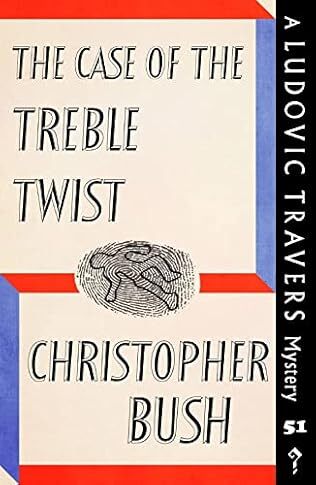The Case Of The Treble Twist

A review of The Case of the Treble Twist by Christopher Bush – 2505
This might be the fifty-first in Bush’s 63 book Ludovic Travers series, but Bush is indefatigable and still capable of pulling off an intriguing and entertaining mystery. Originally published in 1958 and reissued by Dean Street Press, he seems to have hit a bit of a purple patch. His concession to the changing times is to dispense with the cosiness of country house mysteries and allowing a darker, grimmer world to intrude. Mind you, he is still moaning about the taxation rates.
Bush is not afraid to ring the changes. Wharton of the Yard, his comrade in arms and with whom he enjoyed a fractious relationship, each always trying to get one over each other with Travers usually prevailing, does not feature in the story, replaced by Inspector Jewle and Sergeant Matthews, Travers’ own role is a little more loosely defined. Although he is still the owner of the Broad Street Detective Agency he decides to take a curious commission off his own bat, only bringing the Agency in the end for tax and expense purposes, of course, and plays fast and loose with what he discloses to the police. He treads on thin ground and does well to avoid an accusation of withholding vital evidence.
Nevertheless, there are still some very distinctive Bushian features to this novel. As is his wont he starts with a seemingly unconnected incident which happens about four years before the action of the main story, although he telegraphs its impact by saying that it provided an opportunity to see all the characters who will later feature in the narrative. It is quite and clever move. And then there are the old leitmotifs of not everyone being who they claim to be, including the couple who set him on the chase to recover some diamonds which may have been stolen in a raid on a dealer, Speer, and will probably be removed from their hiding place when the remaining thief, Conward, is released from jail, and, of course, a badly burnt body, and women changing their hair colouring.
As the title suggests it is a case of double and treble-crossing, you might even argue that there are a couple of sets of treble twists, where there is dishonour amongst thieves, shady secrets and dodgy backgrounds in which a stuffed Sealyham terrier and a roll of Stickwell take centre stage. The cruciverbalist in Travers eventually twigs the connection between Speer, who is known to have been of Italian descent, and the Hope or Band of Hope, believed to be a notorious but uncaught fence for stolen gems. The latter was mentioned by Jewle at the initial meal four years ago at the restaurant owned by Tibball, a jewel thief whose burnt out body is found in a car which crashed shortly after the raid on Speer’s property. Spiro, of course, is the Italian for I hope.
After many twists and turns, Travers manages to piece together what is really going on and who is who, having ultimately the sense to decline to take instructions from the Dawsons. He even manages to bag a handsome reward for the recovery of the jewels, which he distributes to deserving cases and puts the rest in the Agency, for tax purposes, naturally, and the successful resolution earns both Jewle and Matthews a promotion.
The pathos in the story lies in the fate of Kate Howard, a former servant at the Speer establishment and whom Travers has been pumping for information. The blame for her death can be fairly laid at Travers’ door, after persuading her to come to London to divulge some vital information and disclosing her plans to the Dawsons. She never made it, and Travers, who took a shine to her, feels her death, an empathetic side to his character we rarely see.
In summary, this is Bush at his best, a well-worked plot which, while lacking high moments of drama, provides the reader with an ingenious problem that only begins to make sense as the denouement approaches. That is all you can ask for.



